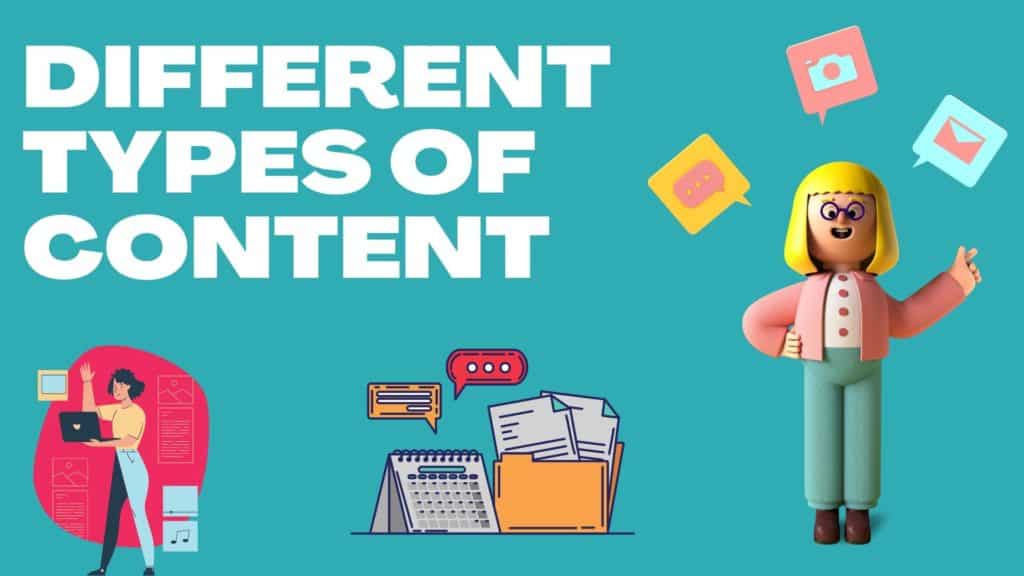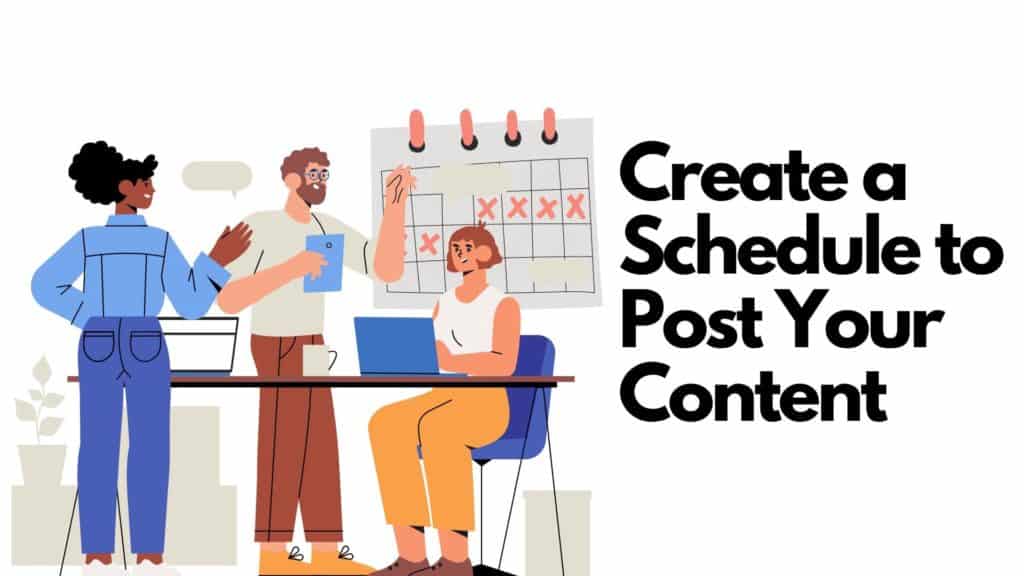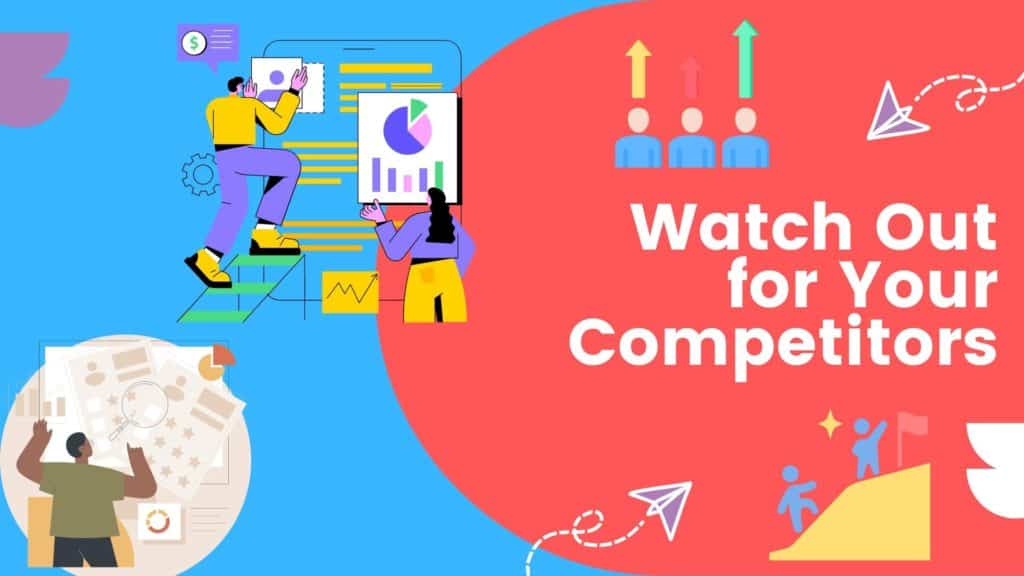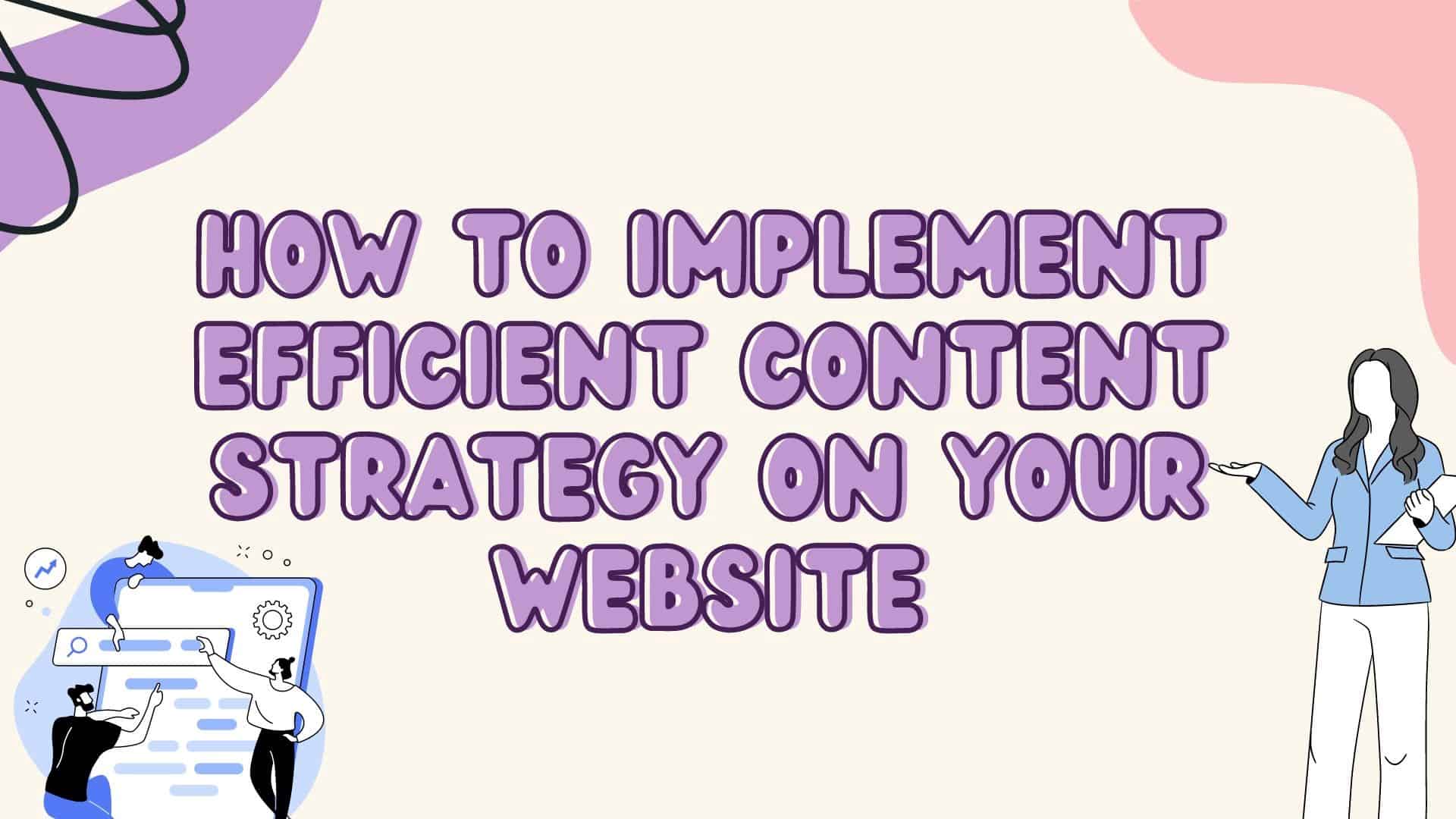How to Implement Efficient Content Strategy on Your Website
In the content marketing world, marketers believe that “content is king.” And while that sounds cliche at this point, you can’t deny how true this is.
You should first draw your customers to your website before you get a chance to convert them. This makes it necessary to make high-quality content a must part of your website marketing plan. It can be time-consuming to go through the content creation process. You can, however, speed up the process by developing an efficient content strategy.
A great content marketing plan starts with planning and documentation. But companies often skip the planning parts and dive directly into content creation. In fact, only 40% of them have a documented content marketing plan. Their content often lacks a purpose, doesn’t target the right people, or isn’t consistently published.
Realizing you need a strategy is one thing, but knowing how to create one is another. And content marketing doesn’t stop at developing a plan to reach your marketing goals. You also need to know how to put the strategy in place.
Table of Contents
Key Elements of an Efficient Content Strategy
It’s true that there isn’t a one-size-fits-all solution to meet your content marketing goals. Every business is different, so each of its content marketing plans is different. Despite that, each successful strategy has a lot in common.
Having an effective Content Strategy is just as important as having a nice looking website. Content strategy is an essential part of your online presence and website success, because it ensures that all of the content on your site is designed to engage readers and elicit desired actions.
When done correctly, a sound content strategy can help increase leads, conversions, sales and more. It is a fact that an efficient content strategy is vital to draw readers and desired results.
A content marketing agency does more for your business than creating content. Some offer services like keyword research, search engine optimization, publishing, and performance reporting.
Or, you can also form a team of skilled marketers who can optimize your website content for search engines within your organization. Just make sure to fill out each marketing role with the appropriate people.
Experienced marketers know more about what an effective content strategy has. But a successful content marketing plan also involves you throughout the process. With that said, here are the key elements that your content marketing strategy should have.
1. Clear Goals
Setting clear goals is essential if you want to creating content that will help your business. The goals you set will impact your content development cycle in every way.
Do you want to move leads through the funnel or attract new visitors? How about building brand recognition? Perhaps you want to improve customer service or speed up the sales process.
You can have multiple goals or just one. In any case, each of these requires tailoring your content. This means experimenting with different methods and monitoring various metrics.
For example, infographics are shareable, digestible, and appealing. This makes it an excellent type of content for expanding your audience. Ebooks, on the other hand, are great for converting readers into leads.
You’ll also create call-to-actions (CTAs) and linkages with other content pieces in your library. These will be based on the unique goals of each piece of content.
2. Target Audience Profiles
Developing your relationship with your audience is important when it comes to producing the right content for them. It’s also important to understand which content marketing approaches, such as brand journalism or thought leadership, are most effective for your specific situation. You can better connect your content marketing goals with their needs by having a clear understanding of your audience.
In essence, you should have all the data of your customers in a customer or audience profile. Knowing your target market is important since these are the people who you will be interacting with. Not only that but developing a customer persona influences how you communicate and produce content.
In a world where information and messaging goes at breakneck speed, you need to step up your game and stand out in order to engage new readers and keep existing ones. One of the most efficient and powerful ways to to do this is by understanding and targeting audience profiles and mapping the buyer’s journey.
By crafting unique content which reaches specific audiences, catering to their interests and preferences, you can increase engagement levels, reader loyalty and ultimately website conversion rates. Moreover, if you create distinct personas that accurately match real people’s needs and wants, then it will be easier for you to build relationships with them via targeted content marketing strategies that generate results.
But the problem is you don’t often interact with your customers directly. To solve this, you can hire content marketing agencies that devote their time to your content marketing strategy.
3. Different Types of Content

Every content marketing plan needs a blog. This way, you can write blog entries to engage your audience. But blog postings aren’t the only kind of content you should use for your campaign. Not everyone loves reading blog entries; other people prefer visual or audio information instead.
That’s why your website should have a variety of content that piques the interest of different personas. You can use infographics, publications, webinars, and videos showcasing your products. You can also create case studies, interview key figures in the field, and host podcasts.
4. The Right Content Marketing Platform
Even if you have a great strategy for your content marketing campaign, people can only carry out so much of it. Your staff may become less productive, efficient, and organized without the proper tools. They may not be able to carry out some elements of your campaign without technology.
That’s why finding the right content marketing platform is important for a successful content strategy. Invest in the right platforms for planning, developing, publishing, and measuring content. Aside from these, you can use some of them for content research and planning.
5. Robust Distribution and Promotion Plan
Crafting the perfect content is only half the battle – without the proper distribution and promotion, all that hard work can be for naught. That’s why it’s so important to have a well-thought-out content strategy: one that takes into account not just your message, but also how it will reach your desired audience. Distribution and promotion are key components of any efficient content strategy, as they ensure that your content reaches the correct people in the right way.
Tips to Implementing Your Content Strategy
Once you have developed a content marketing plan, it’s time to implement it. This can also be a bit tricky and involves a lot of factors to consider. At some point, you might find that the type of content you’re using doesn’t go well with your audience. Or that there is a lot you need to improve upon in your strategy.
This section outlines some important tips when it comes to executing your content strategy.
1. Create a Schedule to Post Your Content

To maximize how your content will perform, make sure you schedule exactly when you want to post your material. There are a lot of ways you can create a content calendar.
You can use Google Calendar to enter the due dates for each piece of content. This works well for those who don’t post a lot. But if you produce a lot of content and need to manage a content team, you’ll need extra functionality.
Project management tools can help you do these. You can also employ content marketing services to produce content on a specified schedule.
2. Evaluate the Performance of Your Content
You can’t produce the same type of content that doesn’t bring you a lot of benefits. For that reason, you should assess how each of your content performs. To do this, you need to revisit your KPIs to see what has changed and if you’re meeting your goals.
There are a lot of programs and applications to check your content’s performance, such as Google Analytics. There are also other social analytics tools like Google Alerts and Mention to see if people share your content. These solutions help you meet your brand awareness and engagement KPIs.
3. Utilize Storytelling Method
Storytelling is an invaluable tool that can be used to captivate your audience, evoke emotion, and make a lasting impression. Content strategists understand this implicitly and use this powerful tool as an effective part of their content campaigns. In return, readers will trust your brand more, which helps you market solutions to their problems.
4. Prioritize Quality Over Quantity
You can gain a lot by posting a lot of content online and on your website. But make sure that what you’re posting is high-quality. Having a huge content marketing team or a reliable content marketing agency can make this possible. Nevertheless, it’s always preferable to prioritize quality over quantity.
It’s tough to maintain your own strategy when you pump out a lot of posts. It can also be difficult to consistently come up with topics that are actually fascinating. Unfortunately, a lot of businesses turn to writing topics that a lot of websites have covered. This doesn’t offer their audience anything fresh or useful.
Choose topics that your target audience is really interested in and present your own viewpoint.
5. Watch Out for Your Competitors

Keeping an eye on your industry is one thing, but it also helps to watch out for your competitors. This means finding out what types of content they often produce and which topics they write about.
Chances are that they use a different content strategy from yours. Understanding how they market their content lets you see what your company can improve on.
FAQ’s
1. Is content marketing the same as SEO?
The answer to this is important to do both tasks successfully.
Content marketing is a comprehensive approach that targets users and engages them as they switch between different channels. Knowing where to publish each content and how to target customers on them is important to your content strategy.
Search engine optimization (SEO) aims to make your content as accessible to users as possible. This starts with making your content more visible in the relevant searches. It also involves broader, technical variables that have an impact on how visitors interact with your website.
2. Should I only publish original content?
It’s a golden rule to publish content of your own. But that doesn’t mean you can’t use the same information and publish it in a different format. While you should post constantly, there are ways to make the process easier. Repurposing material is among the most effective strategies.
Producing information in one format and then adapting it for another is what repurposing is about. You can create an infographic that shows the figures stated in your blogs. It’s also possible to present the figures through a webinar.
Repurposing material saves you time and effort as well as widens your audience reach. A blog article might not be to everyone’s taste, but a webinar might suffice.
3. When should I publish new content?
People consume different content at different times. But, in general, you should publish new information at least twice every week. If you can do more, you can post once, twice, or even three times every day to increase traffic to your website. It is up to you to decide how much time and effort you can dedicate into creating content.
You should know that Google honors websites with consistently updated material. On most sites, social media algorithms are the same.
4. Should I focus on creating longer content?
Some experts believe that people prefer shorter content since they can absorb the message easily. On another note, long-form content generates better conversions.
The best thing to do is to figure out what your audience prefers. Try out both short and long blog articles to discover which is more popular. You’ll be in a better position to organize your content per your decision if you have some evidence to support it.
Final Thoughts
Content strategy can be a powerful tool in communicating with your audience and delivering impactful messages. By taking the time to understand your audience, set realistic goals, and create content that resonates with them, you can ensure that your website is working for you in the most efficient way possible. Understand that the key to better ranking is SEO content writing services as they are extremely important to improve your content score and make your website rank.
Implementing an effective and sustainable content strategy can help you build relationships, drive traffic towards your website, and eventually increase revenue. So take the first step towards success today and start building an effective content strategy for your website!




